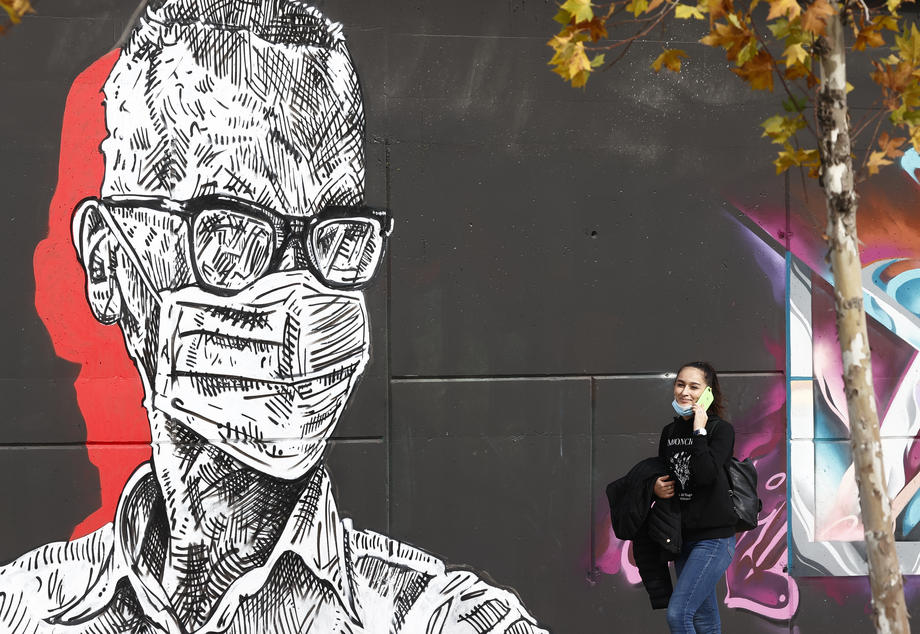

Members of Kosovo’s diaspora have already contributed hundreds of thousands of euros to a fund established by the acting government to tackle the effects of the coronavirus pandemic, leading some political figures to question the state’s reliance on financing from abroad.
On April 12, acting Prime Minister Albin Kurti appealed to the Kosovo diaspora for financial support to help overcome the socio-economic issues caused by the coronavirus outbreak. “Any time Kosovo needed something, you have been close and your love for Kosovo was unconditional,” Kurti stated in a video message.
“In these times when states are isolated as a protective measure against COVID-19, the near future of Kosovo looks uncertain, and with a lot of deficiencies,” he continued, adding that help was needed now more than ever.
Soon after, a number of photos showing transactions contributing to the fund went viral on social media, with members of the Kosovo diaspora showing their eagerness to support the initiative. According to spokesperson for the acting government Perparim Kryeziu, by April 15 donations had reached more than 200,000 euros, and that amount was rapidly increasing.
The contributions will be collected in a joint account alongside an Emergency Fund of 170 million euros set aside by the acting government, as well as donations by states and other international organisations that have provided aid to Kosovo during the pandemic.
However, Kurti’s appeal for financing from the diaspora has also reopened debates about Kosovo’s reliance on funding from abroad.
Driton Selmanaj, an MP representing the Democratic League of Kosovo, LDK, criticised the appeal in a televised debate, stating that “the state cannot function on charity.”
Suad Sadullahi, a 41-year-old Kosovar living in Sweden, disagrees with this approach. “If you call this a charity, then should we also call the aid from friendly countries charity,” he told Prishtina Insight.
Sadullahi, who runs a small business with his wife in the town of Staffanstorp, donated 500 euros in support of the initiative. “This is a situation where every country is facing problems handling these health and economic crises,” he said. “We have family members and parents in Kosovo who are old, and they all might need economic assistance and health care tomorrow.”
Enver Robelli, a Kosovo-born journalist who lives in Switzerland, echoes Sadullahi, stating that the sense of ‘communitarianism’ is welcomed, as the crisis has become a threat to marginalised groups in Kosovo. “In difficult times it is normal to see national mobilisation to collect aid for those who need it the most,” he told Prishtina Insight.
Robelli believes that the debate on the government’s initiative is rooted in traditional parties’ aversion towards the impact of the diaspora on Kosovo’s economic and socio-political life. Kurti’s Vetevendosje enjoys strong support within the Kosovo diaspora, and won the majority of diaspora votes cast at the 2019 parliamentary election.
“For a few years certain politicians from traditional political parties have given a negative connotation to the word ‘diaspora,’” Robelli said, noting that both LDK and the so-called ‘war wing parties’ born out of the Kosovo Liberation Army, KLA, that have dominated Kosovo politics in recent years have lost support from diaspora.
“I am convinced that if there was another government in power, people would be more hesitant to donate because older parties have less credibility,” said Robelli.
Deputy Minister of Foreign Affairs and Diaspora, Liza Gashi, rejects the idea that there is an increasing anti-diaspora voice within Kosovo, stating that such sentiment comes from an “isolated” number of people.
“The reactions of some individuals towards the solidarity of our diaspora is destructive and comes from a tendency to want protagonism in the difficult time we are facing,” Gashi told Prishtina Insight.
Osman Osmani, a pensioner living in Switzerland, said that the initiative is reminiscent of the 1990s, when the Kosovo diaspora kept the parallel education system alive by sending millions of euros back to Kosovo, and later helped finance the KLA’s guerilla war.
“The creation of the three per cent fund in the ‘90s, as well as the financial support of the KLA and Kosovo’s reconstruction after the war, helps explain the readiness, commitment and solidarity of the Kosovo diaspora for Kosovo society,” Osmani said.
Regarding the latest initiative, Osmani insists that distribution of the money collected from the diaspora should focus on paying workers whose salary has been affected by the pandemic. “Finances from the diaspora should be dedicated to employees and families in need, who make up the majority of the society – not the owners of the businesses,” he said.
Fundraising for Kosovo citizens from the diaspora has not only been carried out through the government. The Besa foundation from Germany, the Kosovo Producers’ Club and the NGO Germin, together with the Global Albanians Foundation based in the US, have started a fundraising campaign to help families in need in Kosovo that are struggling as a result of the coronavirus outbreak, providing them with basic food and hygiene products.
“Citizens understand the irreplaceable role of the diaspora in Kosovo’s future, and we have to keep in mind that the diaspora is organized despite what we do,” Gashi said. “We just want to give the opportunity and space to be close to the motherland and organized through institutions.”
16 April 2020 - 13:54

COVID-19 cases in Kosovo have soared from 30-40 per day last week to m...

The number of active coronavirus cases in Kosovo fell to 733 on Thursd...

The Kosovo Government has relaxed a number of restrictions on public a...

Kosovo has administered the vast majority of the 24,000 doses of the A...